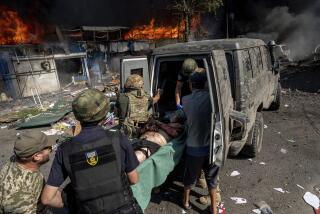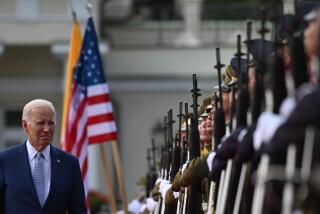Albright Soothes Russia’s Hurt Feelings
- Share via
MOSCOW — Madeleine Albright’s second visit to Moscow as secretary of State lasted barely 26 hours, but it offered the clearest insight yet into the Clinton administration’s efforts to shelter U.S. relations with Russia as it pushes a new European security order that relegates the Kremlin to second-class status.
At a news conference with Russian Foreign Minister Yevgeny M. Primakov on Thursday and again at a meeting with a group of Russian intellectuals before departing Friday, Albright struck an upbeat theme. She noted the strength of growing U.S.-Russian trade ties, a new cooperation in arms control and the success of joint peacekeeping efforts in Bosnia-Herzegovina, and she called Russia “a partner” at next month’s Group of 7 industrialized nations’ summit in Denver.
During her meeting with prominent Russians, Albright even argued that the centerpiece of Europe’s emerging new security order so opposed by Moscow--an expansion of the NATO military alliance--is good for Russia because it will boost stability in historically volatile Central Europe.
For Albright, it is a strategy that can hardly miss in the short term. Moscow is too weak to stop enlargement anyway, and for a Russian public struggling to survive from day to day in the chaotic transition to democracy, NATO expansion is not a life-or-death issue.
“[Russian President Boris N.] Yeltsin is a great tactician, and NATO enlargement is something he can skate around,” said Pavel Felgengauer, a commentator for the Moscow daily Sevodnya. “It’s not like a financial crisis or a banking collapse that would be an immediate threat.”
*
But Felgengauer and others said the dangers lie further into the future. If financial or political instability should undercut Russia’s nascent democratic experiment, and if Moscow’s hostility to NATO fails to melt with time, as U.S. policymakers hope will happen, alliance enlargement and Russia’s subordinate place in the new security order could overwhelm Kremlin ties with the West. If Russia’s democrats should falter, the eastward expansion of a military alliance still widely perceived in Moscow as an anti-Russia coalition would be a tailor-made issue for ultranationalist, anti-Western political forces to seize upon for legitimacy.
Some Western observers have asked whether NATO enlargement might spawn a festering resentment in Russia similar to that which overwhelmed a post-World War I Germany too weak to resist the terms of a harsh peace imposed by the Allies. In Germany’s case, that resentment, coupled with economic despair, provided the steppingstones for the rise of the Nazis, Adolf Hitler and World War II.
“It’s hard for Germans not to have a degree of sympathy for Russia in its present situation,” noted Karl Lammers, a prominent member of the German Parliament and a member of Chancellor Helmut Kohl’s ruling Christian Democrats.
Western policymakers say they are attempting to mitigate the sense of Russia’s humiliation at being unable either to stop or significantly alter the terms of NATO expansion. Indeed, Albright’s decision to travel one-third of the way around the world for a few hours of talks with Primakov aimed at nudging Moscow to conclude a NATO-Russia charter underscores this effort.
In talks Friday before departing Moscow for Washington, Albright and Primakov reportedly made some headway toward that goal.
A senior U.S. official, referring to stories of how Germany’s post-World War I isolation was so extensive that the country was refused loans to shore up its collapsing economy and so petty that Germans were banned from the diplomatic golf course in Geneva, stressed that American policy is focused on ways to reduce the feelings in Russia of being pushed away from the West.
“Don’t exclude them, loan them money, let them on the golf course, but at some point the Russians have to do a little work of their own,” this official said.
More to Read
Get the L.A. Times Politics newsletter
Deeply reported insights into legislation, politics and policy from Sacramento, Washington and beyond. In your inbox twice per week.
You may occasionally receive promotional content from the Los Angeles Times.










